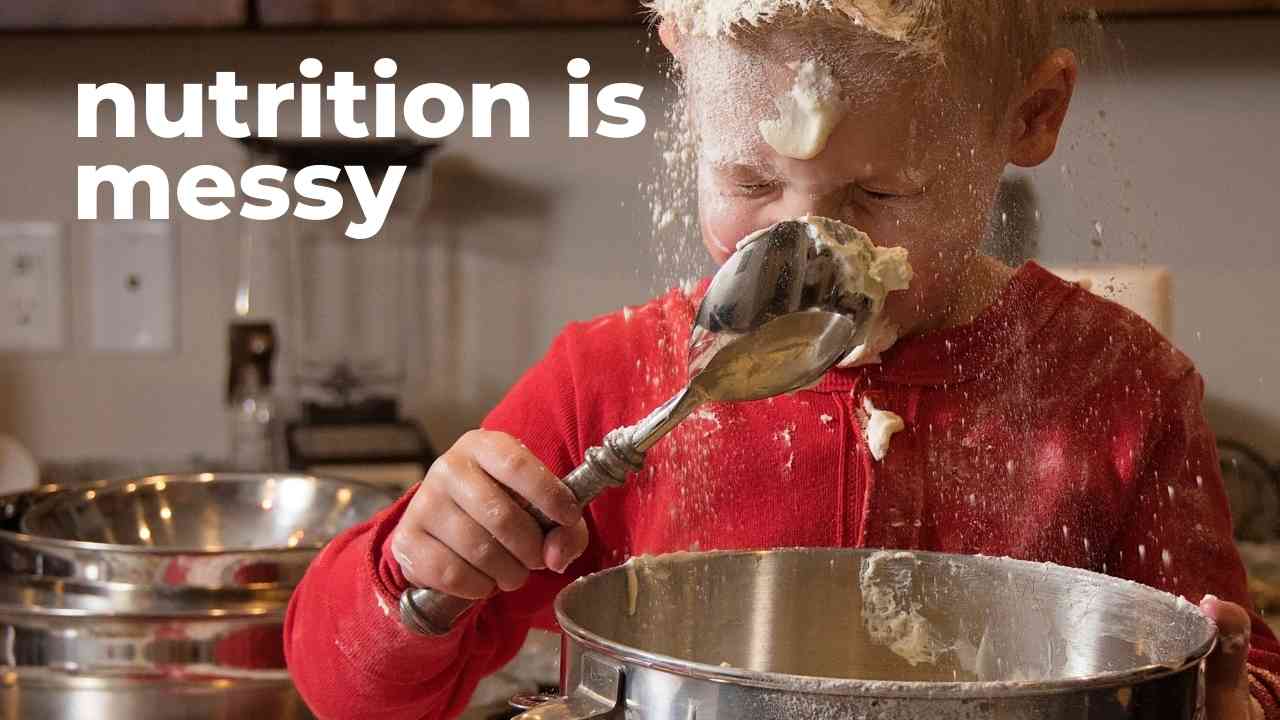
19 Aug Nutrition is messy
It is so easy to underestimate us, humans. It is easy to see the negative impacts we have had in this world as a sign of lack or that there is something intrinsic evil in us. It is easy Wow! It is messy out there. Every time I look at the news, my email, or my Twitter feed, it seems like everybody is in an intellectual feud with somebody else. One of the unforeseeable consequences of the pandemic is that suddenly everybody and their mothers are discussing the scientific method, peer-review publishing systems, the influence of politics on the production of science, the influence of the private sector on the production of science, the efficacy of statistics as prediction tools, the value of expertise and credentials for policymaking, and, of course, the internal mechanisms of mRNA vaccines and spike proteins. I miss when most of the internet was memes about cute, grumpy, or silly cats.

I know it is hard to stomach some of the debates you see out there. I know going into the comment sections of news outlets or social media can undo all that good stuff your acupuncturist did for you last week. I know we are all emotionally involved in this thing. I know there is tribalism, chauvinism, ignorance, arrogance, ineptitude, opportunism, and plenty of lies. And yet, I think this is great.
Hold on! I don’t think it is great that people are getting sick and dying. Of course not. But I think it is fantastic that everybody has to debate the importance of science, and critical thinking, even if those debates can be painful to read. I believe it is crucial that we are identifying how ill-prepared we are as humans to evaluate good sources of information, a well-crafted argument backed up by reality, and what is a sound idea versus just noise and opinion. Even if most of it is just digital screaming and bullying, people have to confront their views daily and quite often put themselves in the shoes of others, which is excellent.
I hope that one future outcome of all this is that we are all better equipped to learn and consume information in these Internet Times. This issue is close to me. I am talking here mainly as a nutrition coach. I see many of my athletes and their families go through a small dose of pandemic-digital-screaming-twitter-feuds when it comes to nutrition. Some people think carbs are the enemy. Some people believe nothing matters but calories, some think plant-based is better than animal-based, and everybody has watched a documentary about it.
As with COVID, nutrition lives in the intersection of biological and health sciences, individual and cultural behaviors, and politics. Here too, there are official policy guidelines up for debate. Noisy people are screaming that their school of thought is the only one and best: Keto! Paleo! Vegetarian! Vegan! Intermittent Fasting! and what-not. There is an overwhelming number of academic studies which are easy to access but hard to parse. And also an endless list of click-bait articles written by journalists amplifying those studies. There are documentaries, podcasts, and influencers. And then there is you, listening to your colleague Jim, who lost ten pounds and swears that being in ketosis is the best thing that has happened in his life while he chugs a full-fat-milk latte he bought at Starbucks.
Well, don’t sweat. I am not solving any of those problems in this email. But because I don’t want to leave it just as a commentary of current times, I want to bring a tiny bit of clarity to this messy mess called nutrition. Because the most common question I get is about what is a vegetable and what is not, today I’ll share with you an easy way to classify plant foods nutritionally. No debates, no feuds, no tribes, no bull  .
.
Check this out. Botanically, a fruit is a ripened flower ovary and contains seeds. Wow! That’s graphic! So technically, a tomato is a fruit, but in nutrition, we consider that a vegetable. On the other hand, olives and avocadoes are fruits too, but we think of them as fats in nutrition. What is rice, then? A seed, and in nutrition, we consider it a carb. Cashews are also seeds, but in this case, we categorize them as fat. Then there is corn, which you think is a vegetable, your smart-ass sister knows is a fruit, and your fitness-obsessed friend Jenna knows deep in her heart is a carb and avoids it like the plague.
It does feel a little bit crey and random. It is not. The problem is that when we define food in nutrition, we have to mix Botanics, Biochemistry, and cultural uses. Ok, so let’s clarify it so that you can go with your life. Just remember, I am keeping this discussion tied only to plant foods.
In nutrition:
▶ Fruits: these are all botanical fruits that have a higher fructose content. Things you would use to make jam and fill in a donut. In plain Colombian English: sweet and delicious plant ovaries (that sounds nasty, I do not apologize). Apples, pears, bananas, guavas, passion fruit, oranges, etc. You know what we are talking about. Fruits have lots of nutrients, water, fiber, and some fructose (sugar or carbs).
▶ Veggies: these are any part of the plant that is low in carbs and fats. These include fruits like tomatoes, zucchini, cucumber, eggplant. And root vegetables like carrots, radishes, and turnips. And of course, all the leaves and stems are veggies too. Veggies have lots of nutrients, water, fiber, and very scarce macronutrients (carbs, fats, and protein).
▶ Carbs: we will consider all nutritional fruits carbs, and any other plant or part of the plant that is starchy and has higher carbohydrate content we also consider a carb. Most root vegetables fall here, like potatoes, yams, and yuccas. But also many seeds like corn, rice, quinoa, couscous, farro, amaranth, beans, lentils, garbanzos and also all cereal grains.
▶ Fats: these are easier! Phew! They are just seeds and fruits that have a high-fat content and include: avocados, olives, peanuts, cashews, pecans, pinenuts, chia seeds, sunflower seeds, and so on.
You might be asking are there any plant foods that are both carbs and fats. Fortunately not. That would make things complicated. However, keep in mind that most veggies will have minor contents of all the macronutrients. Some plant foods like legumes will have higher protein content, so they can be considered a source of carbs and protein. However, plant foods are well behaved, and so the categorization above suffices.
As you can see, things are not straightforward because we are mixing botanicals with biochemistry. Now add to that cultural use. For example, in Brazil, avocado is considered sweet and therefore is fully considered a fruit. That’s a problem! Often this difficulty in classification will transfer to communication errors. Imagine how hard it is to research when people have very different ideas on what a veggie is. If your study depends on people reporting what they eat, things can get messy and complicated.
These days you are bombarded with opinions and articles, with the intersection of science, policy, and human behavior. Keep this example in mind, and go to the sources and embrace the problems we face with the complexity they entail!
Get your hands deep in the mess!


